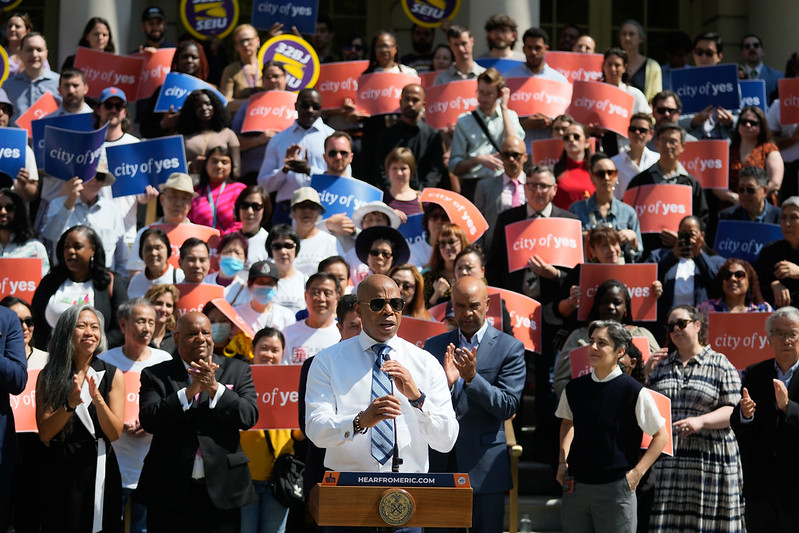In a nation where everything has seemed politicized lately, the stock market isno exception. In the months following Donald Trump’s victory in the presidential election, he’s been credited for a surge that has propelled U.S. stocks to a series of record highs, as well as blamed for a smaller — and shorter — sell-off. In a matter of weeks, the Dow Jones Industrial Average surpassed 20,000 and then 21,000 — two largely meaningless, though enchanting, levels. While many investors are celebrating these gains, how the market and your portfolio will fare duringTrump’s presidency remains anyone’s guess. The market will undoubtedly go through some turbulence in the next four years, but if you’re invested for the long run, you needn’t stress about that. Here are some bits of old wisdom to help you invest wisely under the new president. Keep calm and invest on
Here’s a timeless rule that’s particularly apt in periods of change: Don’t let politics or market euphoria dictate your investing decisions. Whether you’re already invested in the stock market or you’re thinking about jumping in, now is not the time to make rash decisions. Whatever move you’re considering, ask yourself a basic question: Why now?
If you worry the market’s good times can’t last, you may become anxious and want to sell. But pulling your money out of the stock market could radically affect your portfolio’s trajectory, particularly if your retirement is still many years away. Unless retirement is near, mutual funds and exchange-traded funds are still good long-term investment choices. » MORE: 5 tips for investing in your 30s
Alternatively, if you thinkyou’re missing out on a market that seemingly goes up and up, you may be tempted to get in on the action. It seems like a sure bet, right? Wrong.
If you may need that money in the next five years, this could be a disastrous investment decision. Many investors learned this lesson the hard way when a market bubble burst in the early 2000s. What’s more, it’s more prudent to pay off high-interest debt like credit cards before dabbling in investing. If you’re investing with long-term goals in mind, it’s nearly impossible to time the market. Again, you’re not alone. Prognosticators who called for all but a market apocalypse in the wake of Trump’s election also are trying to play catch-up, which has been helping to drive the recent rally. Don’t fixate on any single factor — the president included
While the new president has received a lot of credit for the market rally, some of that is undue, because policy is just one thing that investors consider, says Jon Adams, senior investment strategist at BMO Global Asset Management in Chicago. “The election was almost coincident with better economic data and equity earnings growth, and those two factors are at least equally important,” Adams says.
Yes, Trump has likely influenced stock prices with his tweets and speeches. But taking a broad view of your situation will lessen the risk that your portfolio could be affected by the president or any other single factor. Double-check your diversification
There are many ways to approach diversification. Think different types of assets — stocks, bonds, mutual funds, ETFs and options — as well as the variables within those assets, such as industry, company size and geography. When the bull market ends — and it will, eventually — investors should be prepared with an appropriate mix of investments, says Charlie Bilello, director of research at Pension Partners LLC in New York. “You need to be maintaining bonds and other asset classes outside of equities that are less sensitive to the business cycle,” Bilello says. “You can get in trouble being too concentrated.”
Ideally, your portfolio will have a mix of holdings — be they individual stocks or index funds — that span various industries, company sizes and geographies.
» MORE: How to buy stocks
Speaking of company size, there’s been a lot of press about the Dow Jones index, but it’s made up of just 30 stocks. And postelection, its returns are less than those of the Russell 2000 Index, which includes smaller companies with market capitalizations of less than $3.9 billion. The value of diversification is even more apparent when you check recent performance among the 11 main industries within U.S. stock indexes. Financial stocks are the clear winner postelection — in part because Trump has proposed stripping regulations for this industry — with returns almost five times those of utility stocks. By allocating money across industries, you’ll help buffer your portfolio when a particular sector weakens. Finally, it’s important to consider regions outside the U.S.that are faring even better recently, especially those in emerging markets.“Don’t give up on international exposure. It’s been a tough road for seven years, but these things go in a cycle,” Bilello says. What’s the bottom line?
The most recent gains in stock prices may seem like cause for celebration, but you’ll undoubtedly experience some period of despair during your investing horizon, as well. That’s to be expected. The stock market is riskier than other asset classes such as bonds, so as a long-term investor, you want to take steps to lessen that risk. Trump is an unconventional politician, and trying to predict how his next move will impactyour portfolio is a fruitless task. Instead, let the new president serve as a reminder never to let any single person or event trump the classic tenets of investing: be prudent, don’t chase returns, stay invested and diversify your portfolio. Anna-Louise Jackson is a staff writer at NerdWallet, a personal finance website. Email: ajackson@nerdwallet.com. Twitter: @aljax7. The article Under Trump, Embrace Classic Investing Wisdom originally appeared on NerdWallet.




















